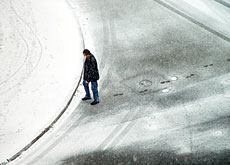
Magnetism proves a tonic for the depressed

Clinically depressed people who don't respond to drugs may have more luck with an experimental treatment which stimulates the brain with magnetic waves.
Geneva’s university hospital treated 30 patients with transcranial magnetic stimulation (TMS), and reported impressive results.
The patients in the Geneva trial were selected because of their strong resistance to conventional treatments, such as drugs and psychotherapy.
“Half of them responded well to this alternative therapy and have remained in a stable condition for several months”, said Dr Rachid Fady, one of the doctors responsible for the Geneva programme.
The technique, which stimulates the cerebral cortex with equipment sending out magnetic impulses, is also used in Spain (a pioneer in this field), the United States, France, Germany, Britain, Finland and Austria.
Though still experimental in Switzerland, TMS is a recognised treatment in Canada and Israel, and is covered by their national health insurance schemes.
TMS is also used in neurology, and in treating Parkinson’s, multiple sclerosis, epilepsy and chronic pain.
Alternative
“In France, TMS is already used as an alternative to drugs,” explained Fady. “It is good to have a number of options, even on patients who respond well to drug-based therapies.”
He added that the therapy was never likely to replace completely anti-depressant drugs, which are among the most widely prescribed medicines in the western world.
There are concerns that magnetic fields – such as electrosmog from mobile phone antennae – could be damaging to the brain.
TMS uses a magnetic field very similar to the type used in magnetic resonance imaging – very strong, but far less rapid than the field required to operate a mobile phone.
“The frequencies we use for TMS are much higher than those used in mobile phones or microwave ovens, but they are applied to the patient’s brain in a very localised and selective way,” explained Fady’s colleague, Jean Golaz. “We irradiate a cone of just a few cubic centimetres under the cranium.
“We certainly do not burn the brain, which must be intact if it is to respond to the therapy, but we enable it to clear blockages.”
Deaths
“Since magnetic resonance imaging was developed – added Fady – millions of scans have been performed all over the world.
“And yet there have been only seven deaths due to misuse of the equipment. The victims were people who should never have undergone an examination of this kind because, for example, they had metal objects lodged in their brains as a result of surgery.”
TMS has also aroused interest as a possible way of enhancing mental faculties. Because it activates certain areas of the brain, some think it could conceivably improve the processing power of the mind, speeding up learning or performing complicated mathematics.
“In Australia, there has in fact been some research of this kind, and a number of scientific papers have been published in the United States,” said Jean Golaz. But it is not really advisable, in our opinion; it smacks of science fiction and could be dangerous.”
swissinfo, Raffaella Rossello
Anti-depressants are among the most widely prescribed drugs in the western world.
5% of the Swiss population suffers from clinical depression, and 20% go through a period of severe depression at some time in their lives.
Switzerland has one of the highest suicide rates in the world, with about 1,400 cases a year in a population of nearly 7.5 million.
The Swiss spend SFr230 million a year on anti-depressants.
TMS has also proved useful in treating depression, auditory hallucinations associated with schizophrenia, and epilepsy.
Research into TMS carried out at the University Hospital in Geneva involved 30 patients over a period of two years.
The cost of treatment is generally lower than other therapies.

In compliance with the JTI standards
More: SWI swissinfo.ch certified by the Journalism Trust Initiative




























You can find an overview of ongoing debates with our journalists here . Please join us!
If you want to start a conversation about a topic raised in this article or want to report factual errors, email us at english@swissinfo.ch.